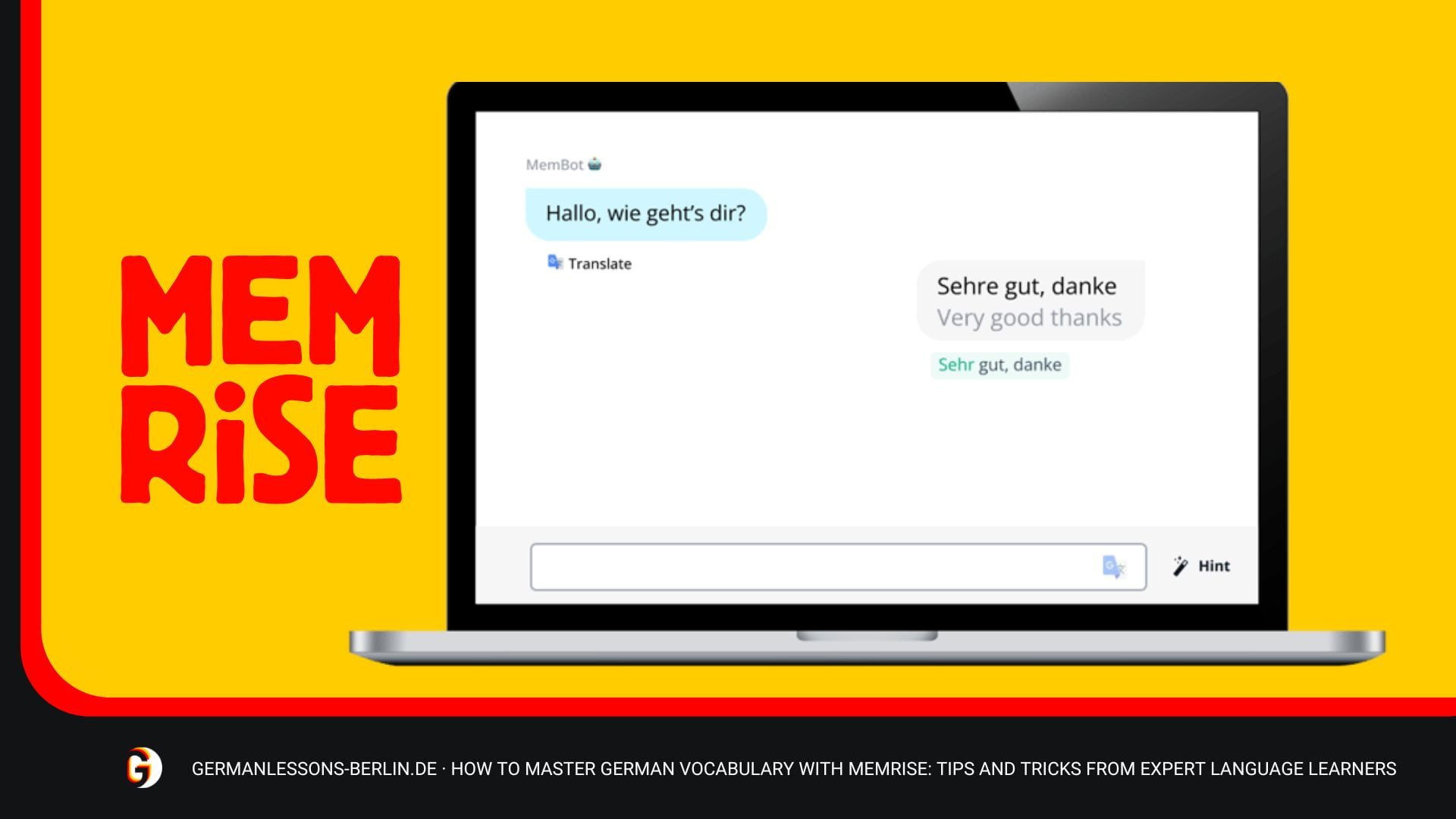Learning a new language can be challenging, especially when it comes to mastering vocabulary. German is an incredibly complex language that has quite a few rules for pronunciation and grammar structure. Fortunately, there are tools available like Memrise that make learning the language easier. In this article, we’ll discuss how to master German vocabulary with Memrise as well as some tips and tricks from expert language learners.
Are you ready to take your German knowledge to the next level? Whether you’re just starting out or have been studying for years, using Memrise will give you access to plenty of useful resources and activities designed specifically for learning German words and phrases quickly and efficiently. With its intuitive interface and helpful tutorials, Memrise makes memorizing new words fun and easy – even if you don’t consider yourself a natural-born linguist!
You won’t need any prior experience in order to use the program effectively; all you need is dedication and enthusiasm. Ready to get started? Read on for our detailed guide on how to properly utilize the features of Memrise so that you can start speaking fluently in no time!
Table of Contents
What Is Memrise?
Memrise is an educational platform that helps people learn and memorize new words in a foreign language. It’s specifically designed for those learning German but can be used effectively to master any language. Whether you’re just beginning your journey into the German language or are further along on your path toward fluency, Memrise provides an excellent way to build a vocabulary quickly and easily.
The main feature of Memrise is its spaced repetition system (SRS). This system works by presenting users with questions about specific words they have already learned; as these words become more familiar over time, the frequency at which they appear decreases accordingly. In this manner, users gradually increase their knowledge of German without having to manually review all previously-learned material every day. As a result, learners not only gain exposure to new concepts faster than ever before but also develop better long-term memory retention capabilities.
In addition to SRS, Memrise offers multiple other features, including audio recordings, varying difficulty levels, and personalized quizzes. These tools help ensure that each user gets the most out of their experience while still engaging in meaningful activities tailored to their individual needs. With so many helpful resources available through one convenient platform, it’s no surprise why Memrise has become such a popular choice among foreign language learners worldwide!
Creating A Study Plan
Creating a study plan is essential for mastering German vocabulary with Memrise. It can help you stay motivated, track your progress, and ensure that you are consistently learning new words. Here are some tips and tricks on how to create an effective study plan:
First, set realistic goals based on the amount of time you have available to commit to language learning. Consider setting weekly or monthly goals that challenge but don’t overwhelm you; this will keep you encouraged as your proficiency increases over time. Additionally, determine which type of activities work best for you – such as studying alone or attending classes – so that you can tailor your plan accordingly.
Second, break down each goal into smaller steps that make it easier to manage the workload. For instance, if one of your goals is to learn 500 new words in two months, divide those words into manageable chunks by creating lists and reviewing them periodically throughout the two months rather than trying to memorize them all at once. Also, consider focusing on specific topics like greetings or food items instead of randomly selecting from different categories. This ensures that your knowledge accumulates steadily over time instead of feeling scattered across many topics.
Finally, find ways to incorporate language learning into everyday life rather than just relying on traditional methods like textbooks and exercises. Try listening to podcasts while commuting or watching films with subtitles when relaxing in order to get used to speaking German and become familiar with slang terms and dialects too! With these strategies in place, you’ll be able to build up a strong foundation in German vocabulary quickly and efficiently using Memrise.
Learning New Words And Phrases
Now that you have created a study plan for mastering German vocabulary with Memrise, it’s time to start learning new words and phrases. No matter what level of language learner you are, there are some tips and tricks to help you get the most out of Memrise.
First, use mnemonics when trying to remember new words or phrases. A mnemonic is an association between two things that help you remember them more easily. For example, if you were trying to learn the word “kaputt,” which means broken in German, you could use a mnemonic like “KAP – keep away from people (because it’s broken)”. This will make it much easier for your brain to recall this information later on.
Second, create flashcards using the Memrise platform so that you can test yourself often on new words or phrases. Flashcards work because they force us to constantly review material until we fully understand it. You don’t need fancy programming skills either; all you need is access to a computer and an internet connection! With just one click of a button, you’ll be able to create highly effective digital flashcards quickly and easily.
Finally, try writing down the new words or phrases as well as their translations in a notebook or journal each day. This simple exercise not only reinforces the material but also allows learners to track their progress over time. Even though technology has made learning languages faster than ever before, traditional methods such as handwriting still remain incredibly powerful tools for long-term memory retention.
Developing Pronunciation Skills
Developing a native-level German pronunciation is key to mastering the language. With the right steps and dedication, it’s possible to make significant progress in this area. Here are three tips for improving your German accent:
- Listen – Listening to native speakers of the language can be very helpful when learning how to pronounce words correctly. By listening carefully, you will get an idea of how certain sounds are formed and how accents vary from region to region.
- Practice – Practice makes perfect! Dedicate time each day to practice speaking aloud with words that may seem difficult at first. This will help you become more familiar with the sound of the language and hone your ability to use proper intonation and stress certain syllables.
- Use Technology – There are many types of technology available today that can help you improve your pronunciation skills, such as apps or online courses specifically designed for learning a foreign language’s accent and pronunciation rules. You should also take advantage of audio recordings, which allow you to listen closely while comparing yourself against others who already speak fluently in German. By focusing on these areas, learners can confidently develop their own personal German accents and feel proud of their accomplishments. Additionally, they’ll have greater success understanding spoken conversations in real-life settings or while watching films or television series in German, allowing them to fully immerse themselves in the language.
Reinforcing Vocabulary With Flashcards
Now that you have built a foundation for German pronunciation, it’s time to move on to mastering vocabulary. One of the most effective tools for learning and reinforcing new words is using flashcards. They can be used in many ways: from traditional paper cards to digital versions such as those offered by Memrise.
Memrise flashcards are an excellent way to learn new words or phrases quickly and effectively. With their spaced repetition system, they help you retain information much better than other methods, such as rote memorization. You can even customize your own flashcard deck with pictures and audio files for extra language practice! Additionally, the app keeps track of all your progress so you can easily see which areas need more work and where you have made improvements.
When creating your own custom vocabulary flashcards, focus on key terms related to the topic area being studied. For example, if studying food-related topics in German, some essential words may include items like “bread” or “cheese” while more advanced concepts could involve recipes or cooking techniques. As your skills improve over time, continue adding more difficult terms until reaching a fluency level in the language.
By regularly practicing with flashcards German vocabulary – whether through Memrise or any other method – learners will find themselves rapidly advancing and feeling confident when conversing in this beautiful language. This type of focused study should become part of one’s daily routine as it helps build proficiency faster than simply reading books or watching videos alone ever could. So grab a stack of cards and get started today!
Utilizing Spaced Repetition Technique
Spaced repetition is an effective language-learning technique that can help you master German vocabulary quickly. It allows learners to focus on the words and phrases they need to learn in a systematic way, while also retaining them over time. This approach has been used successfully by language learners of all levels for decades.
| Emotion | Description | Action |
| Surprise | Learning new skills faster than expected | Take advantage of this method with regular practice sessions |
| Confidence | Feeling secure about your ability to remember information long-term | Focus more energy on mastering one concept at a time instead of cramming multiple concepts into one session |
| Motivation | Receive positive feedback from results after consistent effort | Reward yourself for completing goals or passing milestones within each lesson plan |
The key to utilizing spaced repetition effectively is consistency. Regularly reviewing material ensures that the German language doesn’t fade away as quickly as it was learned. With this technique, you don’t have to worry about forgetting what you’ve already mastered – because every few days, you’ll be tested on it again! It’s important to set realistic goals and challenge yourself without overwhelming your mental capacity; breaking up larger tasks into smaller ones helps tremendously. Additionally, tracking progress gives insight into how well the strategy works for each individual learner.
With perseverance, patience, and dedication, any motivated student can utilize spaced repetition techniques during their journey towards mastering the German language and its vast variety of vocabularies. The combination of this powerful strategy along with consistent practice will lead to an improved retention rate and ultimately greater success in achieving fluency in no time!
Joining Online Language Communities
Joining online language communities is one of the best ways to master German vocabulary. With these groups, you’ll be able to connect with other language learners and find support for your journey. Language forums offer a wealth of resources, such as advice on memorizing techniques and tips from experts in the field. Additionally, many German language learning groups provide helpful feedback regarding pronunciation or grammar challenges that may arise during practice sessions.
The benefits don’t end there; by joining an online language community, you can also get access to interactive activities like quizzes and flashcards, which are great tools when it comes to mastering new words and phrases. You can even create customized exercises based on what you’ve learned so far in order to challenge yourself further. Being part of a supportive network makes learning easier and more enjoyable as well!
If all this sounds too good to be true, then give it a try! There are plenty of active German language communities out there where you can meet fellow learners and exchange ideas about how to succeed at mastering the language. Connecting with others who share similar interests increases motivation levels while providing much-needed encouragement throughout the process. So join a group today – start making friends and continue growing your knowledge base!
Practicing Conversation With Native Speakers
Having a strong grasp of German vocabulary is only half the battle. It’s now time to move beyond memorizing words and start practicing conversation with native speakers! If you want to truly master German, speaking it on a regular basis is essential.
One way to practice your conversational skills in a low-pressure environment is by joining online language communities like Lang8 or Interpals. Here, you can find other language learners willing to correct your sentences and help you understand the nuances of the German language. By exchanging messages with native speakers, you will quickly become more comfortable using the phrases and expressions that make up everyday conversations. You can even use video chat apps like Skype for free audio/video calls if you are feeling brave enough!
You might also be able to join real-life groups of German language learners near where you live. These discussion groups give an opportunity to interact directly with people who speak German fluently – plus, they are often much cheaper than traditional tutors or classes! However, if there aren’t any local meetups available, then why not try looking for virtual ones? There are plenty of platforms out there offering group sessions and one-on-one tutoring over the internet. Don’t let location get in the way of your journey toward becoming fluent in German!
Practicing conversation with native speakers is key when it comes to mastering the German language. Find an online community (or two!) that works well for you and take advantage of every chance you have to interact with fellow language learners – this will undoubtedly pay off as your confidence grows and your proficiency increases over time.
Accessing Additional Resources For German Learners
For German learners, it can be difficult to find ways to effectively practice and master their vocabulary. Fortunately, there are a variety of language resources available online that can help them make progress in their studies. In this section, we’ll explore some additional options for practicing the language and mastering new words with Memrise tips.
When learning any language, one of the most effective methods is watching films or tv shows in the target language. This allows you to get used to hearing spoken German as well as giving you an opportunity to learn more about its culture and history. Additionally, reading books written by native authors will also help improve your comprehension while introducing useful expressions and phrases within context.
Utilizing various apps such as Memrise can also be beneficial when studying German vocabulary. The app provides users with interactive lessons filled with audio samples from native speakers, which helps build familiarity faster than traditional methods. It also offers an array of quizzes and exercises designed specifically for strengthening the retention of words and phrases over time through repetition. By creating flashcards on topics relevant to your interests, you’ll not only be able to remember more quickly but also stay motivated throughout your journey toward fluency.
By tapping into both traditional and digital resources available at our disposal, German learners have access to a wealth of material they can use in order to further their knowledge of the language. Whether you’re just starting out or looking for advanced study materials, these tools provide numerous opportunities for gaining proficiency without having to invest too much time or money into it!
Strategies For Long-Term Retention
For language learners who want to master german vocabulary with Memrise, long-term retention is key. Expert tips can help you make the most of your learning journey and ensure that you don’t forget what you’ve learned. Here are some strategies for achieving this goal:
First, break down larger topics into smaller chunks, so they’re easier to digest and remember. For example, if studying a particular verb in German, focusing on its various forms, such as past tense or conditional, rather than trying to learn it all at once. This way, it’ll be easier for you to recall when needed and will also prevent overload.
Second, use spaced repetition techniques–such as flashcards or apps like Memrise–to regularly test yourself and reinforce information over time. You should also vary how you practice each concept; instead of just reading words aloud or typing them out on paper, try saying them out loud while writing them down too. The more senses are involved in the learning process, the better!
Finally, find creative ways to engage with the material beyond simply memorizing facts. Listen to podcasts about German culture, watch movies with subtitles in the language, or join an online community where other learners come together to discuss their progress and share resources. These activities will not only keep things interesting but also bring extra context, which makes it easier for new concepts to stick around long-term.
Frequently Asked Questions
What Other Online Language Learning Resources Are Available?
When it comes to learning a language, there are many online resources available. From online courses and programs to apps and tutors – the options can be overwhelming. It’s important to take into account the type of learning that best suits your needs and preferences. Here we look at some popular language learning resources you may find useful.
Online language courses provide comprehensive lessons in grammar, vocabulary, pronunciation, writing, and more. You don’t need any prior knowledge or experience, as these courses will guide you through every step of the way. With regular practice, you’ll quickly make progress toward fluency in whichever language you’re studying. Language-learning programs offer an interactive approach to mastering a new tongue, too; with engaging games and activities designed specifically for beginners up to advanced learners alike.
Apps have become increasingly popular over the years when it comes to foreign languages, offering users access from anywhere using their smartphone device. Many include a range of features such as audio recordings, quizzes, and even real-time conversations with native speakers so that users can improve their listening skills while on the go! Online tutoring is also growing in popularity due to its convenience and effectiveness – this one-on-one teaching style allows students to learn at their own pace without feeling intimidated by a classroom setting. Finally, language learning websites offer an array of tools, including articles about culture, dictionaries for translating words and phrases, plus plenty of exercises for practicing conversation skills.
Finding the right resource can be daunting, but if you research what’s out there thoroughly before making a decision, then you should be able to find something that works for you! Whether it’s taking advantage of free content or investing in an immersive course; with the right strategy behind it, anyone has the potential to master a new language successfully
Is There A Way To Practice German Conversation With Other Learners?
Is there a way to practice German conversation with other learners? This is an important question for anyone trying to learn the language. The ability to converse in German fluently requires speaking it regularly and with partners who are also learning the language. Fortunately, there are several ways of finding language-learning partners, so that you can start practicing your German conversations right away!
One great resource available is online forums and chatrooms specifically dedicated to language learners. Here you can find native speakers, as well as people from all around the world who are learning German too. You can even join special topic-based discussion groups or look for specific conversing partners at different levels of expertise. Not only does this give you someone to talk with, but it gives you access to helpful feedback about any mistakes you might make while speaking German.
Another option is using apps such as HelloTalk or Tandem, where you can connect with potential language exchange partners without having to leave home. These platforms allow users from across the globe to match up for one-on-one conversations via text, voice messages, video calls, and more – perfect for those seeking real-time practice with their spoken German skills. With these tools, it’s easy to search for people based on interests or locations, making it easier than ever before to find like-minded individuals eager to help each other reach new heights in their respective languages.
No matter which method you use to seek out conversation partners, they will be invaluable when it comes time to put into practice what you’ve learned through studying vocabulary and grammar books. Speaking directly with another person helps cement concepts much faster than just memorizing terms or rules alone – plus, it’s fun! So take advantage of all the resources available today and get started on improving your German conversation skills now!
How Can I Test My German Vocabulary Knowledge?
Testing your German vocabulary is a great way to measure how much you have learned and compare it against other learners. There are many different methods of testing yourself on new vocabulary, ranging from simple word quizzes to more complex exams that require knowledge of common phrases and grammar rules.
No matter which approach you to choose, there are several useful tools for assessing your German language skills. Vocabulary testing tools such as flashcards can help improve memorization, while online resources like websites or apps offer interactive activities designed to test comprehension. Additionally, taking practice tests or participating in simulated conversations with native speakers can give an accurate assessment of your current abilities.
In terms of preparing for official exams, the best course of action is to find a tailored program that focuses specifically on German language testing. This could include using exam-specific study guides and taking practice exams under timed conditions similar to those found in the actual exam. With enough preparation and realistic expectations, it’s possible to gain a good understanding of what type of questions will be asked during the real exam day – allowing you to confidently tackle any challenges associated with learning German vocabulary and becoming proficient in this new language!
How Can I Track My Progress In Learning German?
Learning a language can be overwhelming. But tracking your progress in learning German is an essential part of mastering vocabulary and increasing your understanding of the language. Knowing how to track progress gives language learners a sense of accomplishment and encourages them to keep going!
There are several ways for expert language learners to track their progress when it comes to mastering german vocabulary knowledge. Here are three:
Practicing Conversation: Practicing conversation with native speakers or other learners helps build fluency, confidence, and accuracy in pronunciation. Talk about topics you’re interested in, ask questions about grammar, or practice reading aloud from books or articles that interest you.
Assessing Vocabulary Knowledge: Regularly assessing vocabulary knowledge by testing yourself on flashcards or taking online quizzes will help determine strengths and weaknesses so you know where to focus your efforts.
Setting Goals: Set goals based on what you want to achieve with the language, such as having conversations with natives or passing exams. This allows language learners to measure their success against these milestones and recognize improvements over time.
By consistently using these methods, experts can get an accurate picture of where they stand with their german studies compared to previous levels of proficiency. The key here is consistency–regular practice leads to increased skills which eventually lead to mastery! With dedication and perseverance, anyone can become proficient in speaking German–all it takes is commitment and determination to learn this beautiful language!
How Often Should I Review My German Vocabulary?
Staying on top of your German vocabulary is an important part of mastering the language. An essential question to consider in this process is how often I should review my German vocabulary. Depending on a variety of factors, such as individual learning style and proficiency level, the answer can vary greatly.
Those looking to build upon their existing knowledge may wish to prioritize frequent review sessions. Consistent practice ensures that newly-learned words remain fresh in one’s memory, while also helping them to better recognize patterns in language structure. Additionally, reviewing old material allows learners to notice any potential gaps in their understanding, which they can then address through further study or conversation with native speakers.
On the other hand, those who are just starting out may find themselves overwhelmed by regular reviews – especially if there’s pressure for immediate results. If this sounds familiar, it might help to focus more on deepening comprehension rather than memorization during the initial stages of learning. The goal here would be to get comfortable enough speaking and listening so that later down the line, you’re able to use what you’ve learned without relying too much on pre-memorized phrases or word lists. As long as you gradually increase review frequency over time – perhaps beginning with simple daily checkups and slowly building up from there – you’ll soon reach a point where your vocabulary knowledge becomes second nature.
No matter what route you decide to take when studying German, setting aside some dedicated time each day (even if only for 10 minutes) is key to making real progress. Focusing consistently on both conversational skills and grammar will ensure that your overall command of the language grows steadily – allowing you to keep track of your improvement along the way!
Conclusion
Now that you know how to use Memrise to master German vocabulary, it’s time to put your learning into practice. Take advantage of other online language learning resources in order to supplement and expand upon the knowledge you gain from Memrise. Don’t be afraid to practice your conversation skills with other learners – this is an important part of mastering any language!
Once you feel comfortable with a particular set of words or phrases, take some time to test yourself. This will help keep track of your progress as well as identify areas where further study might be required. Finally, review what you have learned regularly in order to really cement it in my mind. Doing so will guarantee that I continue making strides toward fluency.
In conclusion, using Memrise for learning German can be incredibly rewarding if used correctly and diligently. With its many tools and features, such as tracking progress and testing yourself, it’s easy to make sure I am on the right path when it comes to becoming proficient in German. Now that I have these tips and tricks under my belt, there should no longer be anything holding me back from achieving fluency!








